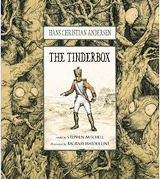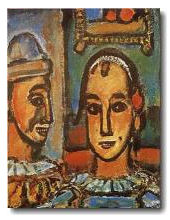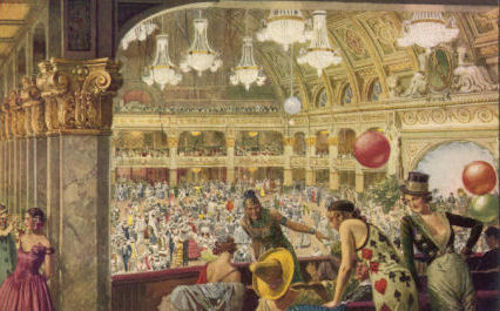




________________________
The BBC tells us that the Blackpool miniseries is a Drama that's a Mystery, a Thriller and a Musical you can bet on. What they don't call it is a Twisted (in the best sense of the word) Love Story, a Comedy, and an incessant and remorseless Series of Deceptions perpetrated upon the innocent viewer. Fairy Tale posing as Satire, in fact. And what could be more adult Fairy Tale than the glitter and gloss of Ripley Holden's refurbished amusement arcade?
Writer and creator Peter Bowker has said that he spent his childhood summers in Blackpool, which goes some way in explaining the childlike Fairy Tale atmosphere permeating the entire miniseries. How are we able to suspend disbelief when four times per Episode these desperately imperfect and entirely lovable characters suddenly begin singing audibly — and even, on occasion, dancing — along with the original Elvis (on two occasions), another Elvis (Costello, this time), Nancy Sinatra, Val Doonican, and Billy Idol, among others, unless we are transported back to a time when everything agreeable seemed possible, and credible?
And not merely the agreeable: with the filmmakers we accept uncritically the most incongruous and disagreeable elements of the story, for example the adolescent mother pushing a disillusioned baby through the arcade in single-minded pursuit of that one elusive slot machine ready to disgorge its contents into her grasping hands. She is seen with the infant leaving the premises in a markedly reluctant manner late at night when Ripley locks up after his opening party ('Come on, Chantelle. When I lock up, the party's over'), and waiting with the stroller and employees Ruth and Barry first thing next morning when Ripley arrives ('Give me some room to open the door, will you, Chantelle?')
Like children we share the filmmakers' childlike uncritical acceptance of everything. Everything, in fact, except hypocrisy. The translucent veil of affection draped upon the main characters, appallingly flawed as they are shown to be, is distinctly missing from such pillars of the community as Deputy Chief Inspector Jim Allbright, accountant Adrian Marr, and other self-satisfied members of Blackpool's social elite, all depicted in sharp unyielding relief.)
Another childlike feature of Blackpool is the literal use of Blackpool as place. Adults are accustomed to allowing the symbol to stand for the whole: a few scenes against the backdrop of the Statue of Liberty and we believe we're in New York; against the Eiffel Tower and we know we're in Paris.
Not so in Blackpool, where photography and essential plot elements combine as a roller coaster careering from illuminated fairground past tramcars and trolleys to Funny Girls transvestite bar before hurtling around the various elements of the 1890s tower, from tearoom to ornate ballroom, from outside observation deck with its glass panel walk of faith floor, to a frantic lovers' encounter by the aquarium built into its foundations. Blackpool, in other words, is a constant literal presence in Blackpool's every aspect.
________________________
The miniseries once-a-week format of Blackpool creates a prolonged uncomfortable telling of the Fairy Tale, as though Jack and the Beanstalk has been sectioned into six parts, with the child being told over and over about Jack leaving home to sell the cow to his returning with the magic beans and a good clouting by his mother, before moving on to the lad's awakening next morning in a darkened room caused by the sprouting of the beans and growth of the beanstalk, thence to Jack's decision to climb the magic beanstalk and stealing of the first bag of gold, and so on.
Meanwhile dread of the Fee Fi Fo Fum fearsome giant in the sky who grinds little boys' bones to make bread accumulates in the child's mind, overshadowing the lure of a hen that lays golden eggs, and a singing golden harp. It is all very unsettling, and quite unlike being told the same story many times from beginning to inevitable end.
On the other hand, it must be admitted that the prolonged miniseries format allows us to linger on cherished portions of the story without being hustled on to the next Episode before we're quite ready. (In dealing with Blackpool's warped logic, lingering is only too advisable, not only for scenes we cherish, but for those we misunderstand at first sight. And second.)
________________________